If you’ve recently picked up a journal and found yourself staring at an empty page, wondering, “What should I even write?”, you’re not alone.
Many people face this exact question when they first start journaling. Looking at a blank page can be really scary at first, but the good news is that there’s no right or wrong way to journal.
The beauty of it lies in its adaptability.
So, what should you write when journaling? The answer is as personal as you are. It all depends on your goals, emotions, and what feels most authentic to you.
You can use your journal to reflect on your day, untangle complex thoughts, express emotions, or simply jot down things you’re grateful for.
Whether you choose to pour your heart out or just list your goals for the week, your journal is a judgment-free zone, a space where you can process, create, and grow.

Journaling is one of the simplest yet most impactful ways to care for yourself. It’s like having a personal therapist, a dream coach, and a mindfulness tool all rolled into one.
Whether you want to manifest your goals, manage stress, or just get to know yourself better, journaling can be whatever you need it to be.
Journaling is one of the best things you can do for yourself in today’s hectic and always-moving world where we’re constantly trying to keep up.
What makes journaling truly special is its flexibility. You can write about your day—what went well, what didn’t, and how you felt about it.
On other days, you might explore deeper topics like your hopes, fears, or dreams. There’s room for everything, from brainstorming ideas and making plans to venting frustrations or celebrating wins.
Some people enjoy using prompts like “What am I grateful for today?” or “What’s a recent challenge I overcame?” while others prefer freewriting whatever comes to mind.
Don’t let the idea of journaling feel overwhelming. You don’t need fancy notebooks, perfect handwriting, or long and poetic entries. Start small.
Write down three things you’re grateful for, or describe one thing that made you smile today. Over time, your journal will become a collection of moments, insights, and memories, a reflection of your journey.
In this blog, we’ll guide you through the endless possibilities of journaling. Whether you’re a total beginner or someone looking for fresh ideas, you’ll find inspiration here.
By the end, you’ll not only have answers to the question, “What should you write when journaling?”, but also feel excited to make journaling a meaningful part of your life. Let’s dive in!
Table of Contents
What Are the Benefits of Journaling for Mental Health and Personal Growth?
We’ve all had those days when your mind just won’t stop racing, overthinking about something, or jumping from one thought to another.
Journaling can be very helpful in giving a pause to such thoughts. It gives your thoughts a place to land so they’re not swirling around in your head. It’s a very good habit for mental health.
Writing things down, whether it’s your worries, your hopes, or just random stuff you need to get off your chest, can feel like a weight being lifted.
One of the best things about journaling is that it helps you process emotions. Let’s say you’re feeling anxious or overwhelmed. Instead of bottling it up, you can write about what’s bothering you.
You might even stumble on a solution or realize that what felt huge in your head isn’t quite so scary when you see it on paper. It’s like talking to a friend who just listens.
Journaling isn’t just about managing stress, it’s also a way to grow. When you take the time to reflect, you start noticing things about yourself.
Maybe you realize you’ve been stuck in a certain mindset, or maybe you see how much progress you’ve made toward a goal.
It’s a bit like looking back at old photos and seeing how far you’ve come but with your thoughts instead of pictures. Or maybe even thoughts and pictures if you choose to paste your photos in your journal.
And then there’s the gratitude part. Writing down a few things you’re thankful for can shift your whole perspective.
It doesn’t have to be big stuff. Sometimes it’s as simple as “the coffee was really good today” or “I got to catch up with a friend.” Those little moments add up and help you see the good in your life, even when things feel tough.
Honestly, journaling is one of the easiest ways to take care of yourself. It’s your space to vent, dream, plan, and reflect. No rules, no judgment. Just you and your thoughts.
How Does Writing Regularly Help with Mindfulness and Self-Discovery?
Writing regularly is like having a conversation with yourself. It gives you a chance to slow down and really pay attention to what’s happening in your mind and heart.
In a world where everything feels rushed, journaling gives you a moment to step back and pay attention, to notice what’s been on your mind, how you’re feeling, and what’s truly going on beneath the surface.
When it comes to mindfulness, journaling works wonders. It helps you notice things you might otherwise overlook.
For example, when you write about your day, you might realize how often you felt stressed or how certain moments brought you joy.
Over time, this kind of awareness helps you live more in the present. You start paying attention to your feelings, actions, and reactions in real-time, not just after the fact.
Journaling might surprise you when it comes to self-discovery. Sometimes, as you write, you uncover things about yourself that you didn’t realize were there.
Maybe you’ll spot a pattern in your worries or start to understand why certain things trigger certain feelings.
It’s like peeling back the layers of an onion. Each writing session helps you get closer to understanding yourself. What’s great about this process is that it’s not about fixing yourself, it’s about understanding yourself.
The more consistently you write, the more natural it becomes to tune into your thoughts and understand what’s shaping your experiences.
It’s a tool for growth, but it’s also a practice of compassion. It lets you be honest and real with yourself without any pressure to have it all figured out.
How Do I Start Journaling When I Don’t Know What to Write?
If you’re staring at a blank page and wondering where to begin, don’t worry, you’re not alone.
The first step to starting a journaling habit isn’t about finding the perfect words, it’s about understanding why you want to journal in the first place.
Think about what drew you to this practice. Are you looking for a way to sort through your emotions? Do you want to track your goals or reflect on your day?
Knowing your “why” gives your journaling purpose, making it feel more meaningful.
Your reason for journaling doesn’t have to be big or complicated. Maybe you’re just curious to see what comes up when you put pen to paper, or maybe you’ve been feeling overwhelmed and need a way to unload your thoughts.
Whatever it is, take a moment to reflect on what you’re hoping to get out of it. This clarity will help guide what you write about and give you a sense of direction, even when the page feels intimidating.
Journaling is deeply personal, and there’s no right or wrong way to approach it. What matters is that it feels authentic to you. You don’t need to write beautifully or have profound ideas, just be honest.
Write what feels natural, even if it’s messy or scattered. Some days, your journal might hold your worries, while other days, it might be a place to dream or celebrate small wins.
Starting with your reason for journaling helps you connect with the practice in a way that feels intentional.
Once you know what you’re hoping to achieve, whether it’s clarity, stress relief, or self-expression, you’ll find that the words come more easily.
It’s not about getting it “right”, it’s about showing up and letting yourself be present.
Is There a Right or Wrong Way to Journal?
As we’ve mentioned earlier, journaling is a deeply personal practice, and the beauty of it lies in its complete freedom. There’s no rulebook, no grading system, and no one-size-fits-all approach.
Journaling is your space, whether it’s a private notebook, a digital document, or even scraps of paper, where you can express yourself in any way that feels natural to you.
Some people find comfort in structured formats, like following prompts or maintaining gratitude lists. Others prefer to let their thoughts spill onto the page in a stream-of-consciousness style.
Both approaches are valid, as are countless others. You might use your journal to process emotions, brainstorm ideas, or simply note down the events of your day. What matters is that it reflects what you need at that moment.
One of the greatest things about journaling is that it’s judgment-free. Your handwriting doesn’t have to be perfect, your grammar doesn’t need to be polished, and your entries don’t have to make sense to anyone but you.
It’s not about creating something beautiful or impressive, it’s about creating something honest and real.
The idea of “right” or “wrong” doesn’t exist when it comes to journaling. What works for one person might not work for another, and that’s okay.
Some days, you might write pages and pages, while other days, a single sentence might be enough. The goal isn’t to meet a standard but to make journaling work for you.
So, if you’ve ever felt unsure about whether you’re “doing it right,” let that worry go. Journaling is a practice of self-expression and self-reflection, and there’s no wrong way to be yourself.
What Should I Write in My Journal Every Day?
By now you would have understood that there’s no single answer to this question because journaling is as personal as it gets.
But if you’re looking for some guidance, having a simple framework can make things easier, especially when you’re just getting started. Here’s a step-by-step approach to help you structure your daily journaling:
1. Ease Into the Practice
If you’re new to journaling, it’s okay to start slow. A great way to get a feel for it is by trying Morning Pages, an idea from Julia Cameron’s The Artist’s Way.
The concept is simple: write three pages of whatever comes to mind, preferably in the morning.
There’s no need for perfect grammar, deep thoughts, or even a clear direction, just let the words flow. This practice helps you clear mental clutter, get comfortable with writing, and even discover ideas you didn’t know you had.
It’s an easy, no-pressure way to build momentum with journaling.
2. Choose a Style That Matches Your Goals
What you write in your journal depends on what you’re hoping to get out of it. If you’re seeking clarity or self-expression, a personal or diary-style journal where you freely share your thoughts might be best.
If you want to develop a positive mindset, a gratitude journal is a great choice because it shifts your focus to the good things in your life.
If you have more specific goals, like managing stress or tracking habits, you might want a structured format. Some journals let you record things like sleep patterns, water intake, or exercise alongside reflective writing.
Take some time to figure out what works best for your needs and lifestyle.
3. Make It a Part of Your Routine
Consistency matters when it comes to journaling, but that doesn’t mean you need to write at the same time every day. It’s more about finding a time that feels natural for you.
Some people love journaling in the morning to set intentions and plan their day, while others prefer writing in the evening to wind down and reflect.
You can even split it up. Use the mornings for planning and evenings for tracking or reflection. The key is to make it fit into your routine without feeling forced.
4. Start Small and Be Regular
There’s no need to aim for perfection when you’re starting out. Don’t worry about filling pages or writing something profound. A few sentences or a short paragraph are more than enough.
What matters most is consistency. Think of journaling as a long-term practice that grows with you.
Over time, you’ll notice how even small daily entries add up to something meaningful that gives you insights and clarity you might not have expected.
5. Keep It Light and Flexible
Life can get busy and there will be days when you just don’t feel like journaling. That’s okay. Skipping a day or even a few is completely normal. What’s important is that you come back to it without guilt.
To keep things fun, make your journaling practice something you look forward to. Add color, doodle in the margins, or use stickers, anything that makes the experience feel personal and enjoyable.
What Types of Journals Can I Keep?
Because journaling is such a personal and flexible practice, there’s no shortage of ways to make it your own. The type of journal you keep depends on your goals and what you hope to achieve through this practice.
As we discussed in the previous section, a gratitude journal is perfect if you want to develop a positive outlook towards life.
A self-improvement journal can help you track your progress and work through challenges.
If you want to turn your dreams into reality, a manifestation journal might be your best friend because it’s all about writing your intentions and visualizing the life you want.
Similarly, a goals journal can be very helpful for breaking down your ambitions into actionable steps.
But what if you want to combine all these aspects like gratitude, goal-setting, manifestation, mindfulness, and self-care into one seamless experience?
This is where something like our Mindful Living Digital Planner can make a big difference.
We designed the Mindful Living Digital Planner to bring together everything you need for a balanced journaling practice.
It’s more than just a journal, it’s a planner, journal, and tracker rolled into one, created with mindfulness, organization, and personal growth in mind.
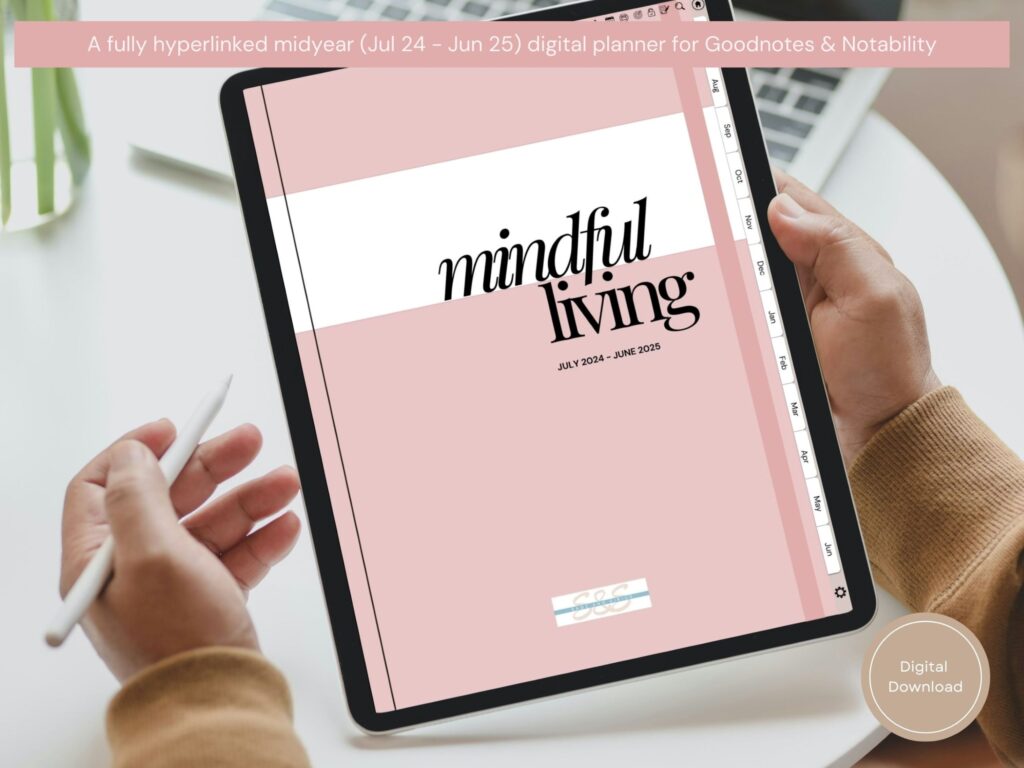
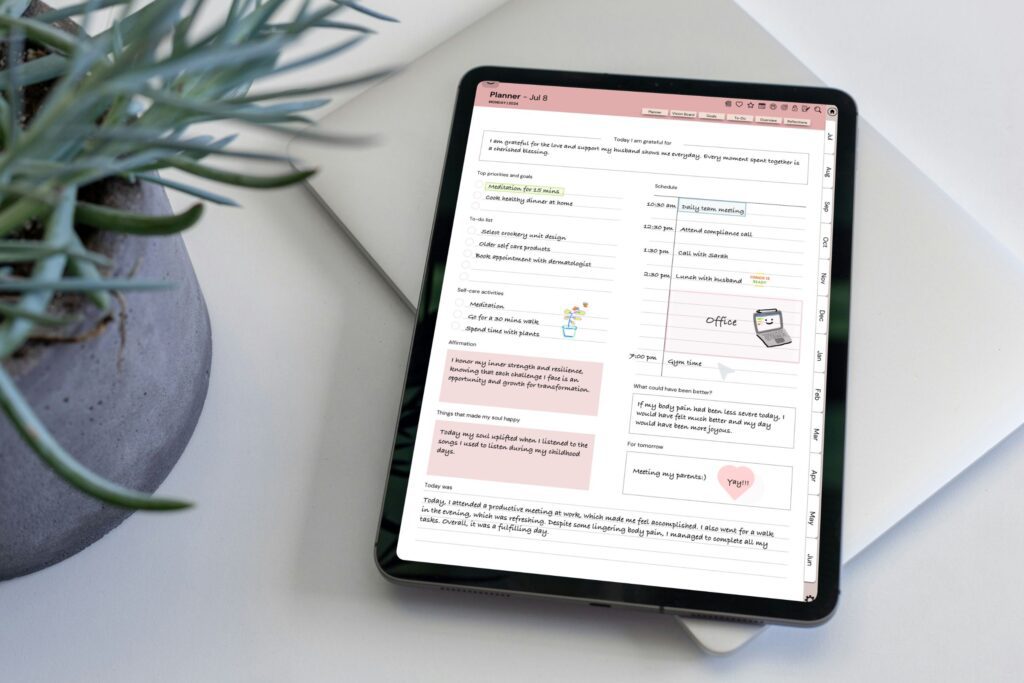
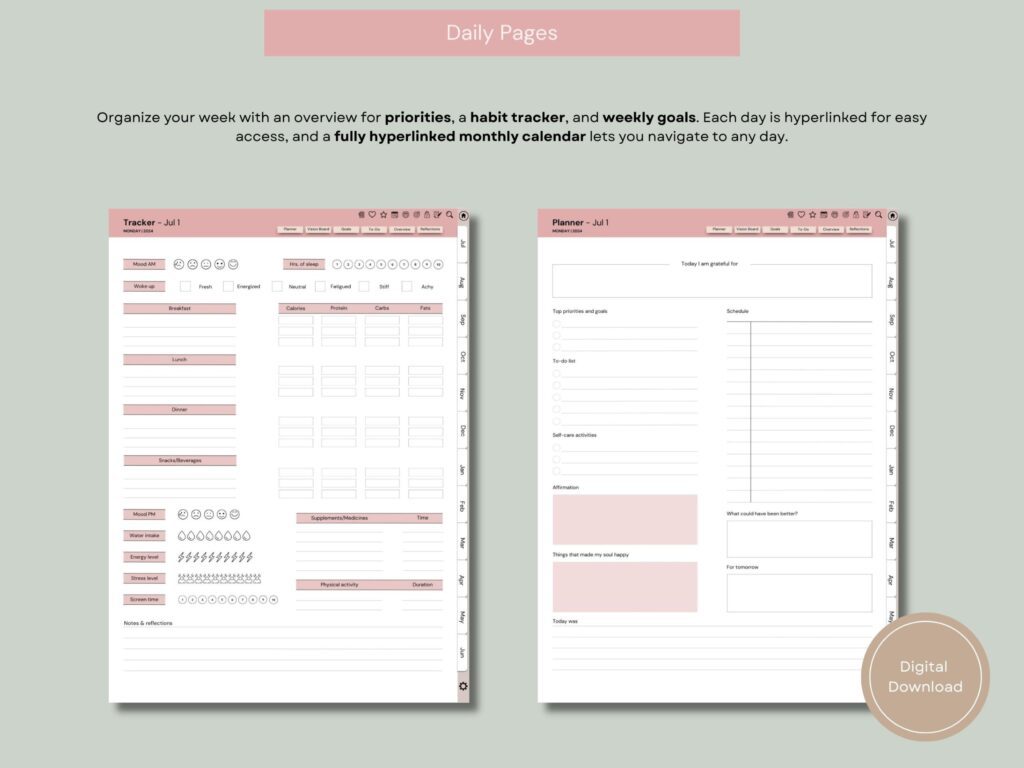
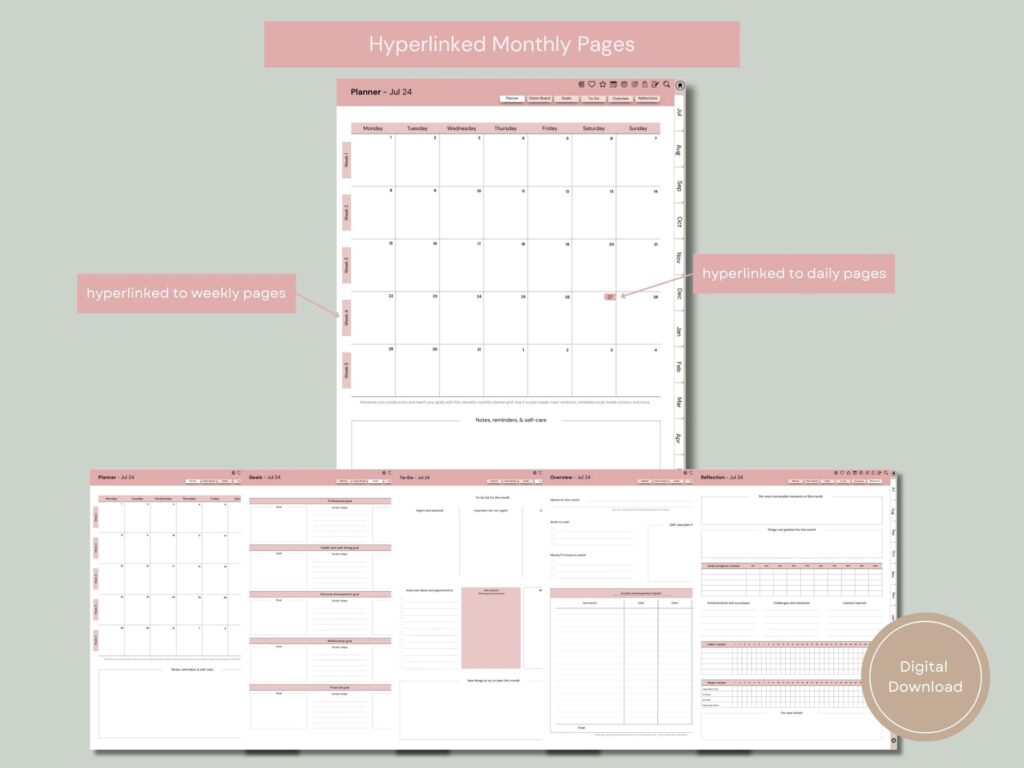
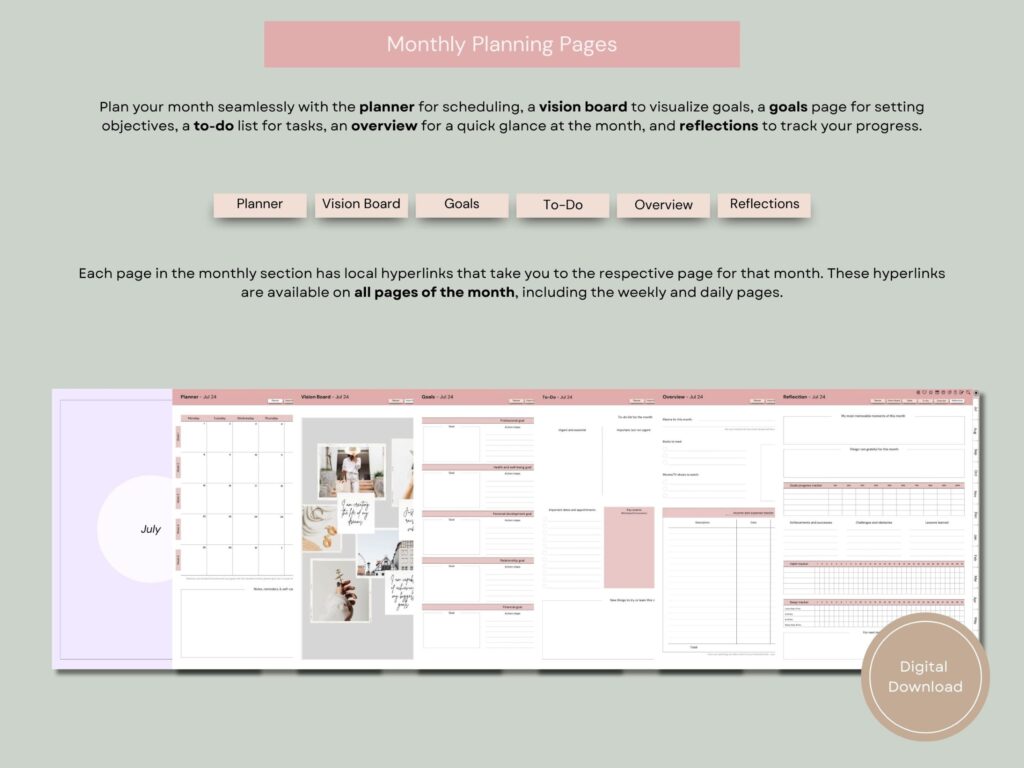
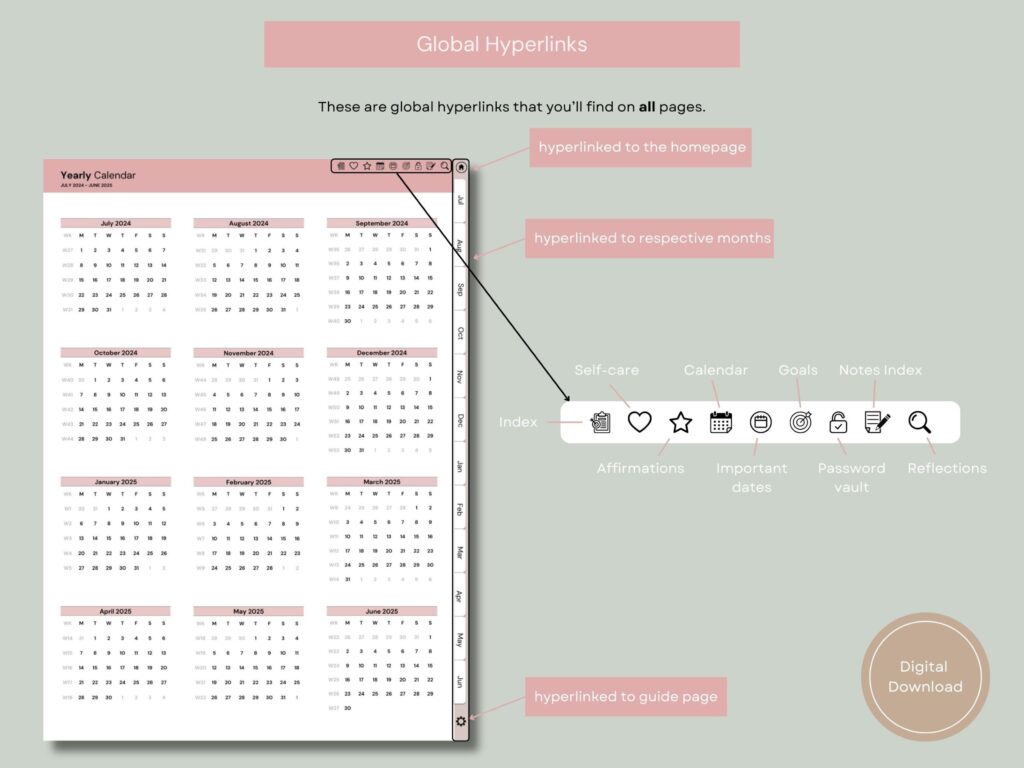
Whether you want to set yearly goals, create monthly plans, or focus on daily habits like gratitude and affirmations, this planner has space for it all. It includes features like:
- Yearly, monthly, and weekly goal-setting pages to map out your dreams and break them into actionable steps.
- Monthly vision board pages to keep your aspirations front and center.
- Daily journal and planner pages that guide you through gratitude, affirmations, and self-care practices while helping you stay organized with to-do lists and reflections.
- A daily health tracker page to monitor your physical and mental well-being.
We’ve kept it very simple and non-overwhelming. All the pages are fully hyperlinked so you can easily navigate between pages. It is a perfect fit if you’re looking to develop a mindful and organized lifestyle.
How Can Journaling Help When I Feel Overwhelmed or Anxious?
When you’re feeling overwhelmed or anxious, journaling can be a safe space where you can unload your thoughts and make sense of what’s going on inside your mind.
It’s a non-judgmental space to express everything that’s swirling in your head.
Journaling is like having a heart-to-heart with yourself. When everything feels too much, simply writing down your worries, frustrations, or even your fears can give you instant relief.
It’s not about writing the perfect sentences or finding solutions but about giving yourself permission to let it all out without judgment.
Sometimes, just seeing your thoughts on paper can give you clarity and a better understanding of them. What once felt like a massive cloud of stress can start to break apart into smaller and more manageable pieces.
You might notice patterns or triggers that are fueling your anxiety, or even find solutions you hadn’t considered before.
If your overwhelm comes from a packed to-do list or feeling like you’re falling behind, journaling can help there too. Use your journal to map out your tasks, prioritize them, and create a simple plan.
Breaking things into smaller steps can make even the most chaotic days feel a little more under control.
Journaling also has the power to shift your mindset. Adding a gratitude list or writing down something positive about your day can help you see the good.
It’s not about ignoring the hard stuff, but about seeing that there are so many positive things too in your life.
So, journaling is an act of self-care. It’s a way of saying, “I see you, and I’m here for you,” to yourself.
How Do I Stay Consistent with Journaling?
Staying consistent with journaling is less about discipline and more about creating a ritual that feels like a treat to yourself. Something that brings a sense of calm and joy into your day.
Instead of seeing it as a chore or another task to be done, see it as a part of self-care and connection with your thoughts and yourself.
Start by choosing a specific time for journaling, even if it’s just a few minutes. The timing doesn’t need to be rigid but should suit your lifestyle.
Maybe it’s right after waking up to set intentions for the day and unloading whatever to-dos you have in your mind, or before bed as a way to unwind and reflect on your day and the progress you’ve made.
The key is, and this is what we also do, to pair it with something that you already enjoy so it becomes a natural part of your day. We generally journal in the morning while having our morning tea.
The next thing you need to do is to create a space that inspires you and feels inviting. Maybe it’s a cozy corner of your home, your favorite park bench, or even just a desk with soft lighting and a warm cup of tea.
You can make this experience even better by surrounding yourself with scented candles, playing soothing music, or using colorful pens.
Another thing you can do is remove pressure. Journaling isn’t about perfection or filling pages, it’s about showing up.
Let go of expectations and allow yourself to write freely, whether it’s a single thought, a messy rant, or a quick gratitude list.
Above all, be kind to yourself. If you miss a day, don’t stress. What matters is returning to your journal because it’s a space where you can reconnect with yourself, day after day.
By turning journaling into a ritual of care and reflection, it becomes a habit you cherish rather than one you have to force.
Wrapping Up – What Are You Supposed to Write in a Journal?
Life today moves so fast it can feel like we’re constantly trying to catch up.
Daily, we’re trying to manage responsibilities, stay on top of evolving technology, and meet the ever-growing demands of our careers.
In doing so, we generally forget to take care of our overall well-being, which over time can lead to bigger problems that will affect different aspects of our lives.
That’s why all of us need to have a toolkit that includes practices and activities like mindfulness, regular exercise, eating nourishing meals, practicing gratitude, and taking time to truly care for ourselves.
And at the heart of it, journaling stands out as one of the simplest yet most powerful tools you can use to slow down, reflect, and reconnect with yourself.
Journaling is one of the best things we can do to improve our mental well-being, become a better version of ourselves, manifest our dream life, and develop a positive outlook toward life.
Over time, it becomes more than a habit, it becomes something you look forward to, a part of your day that centers and grounds you.
As we’ve discussed throughout the blog, journaling is a personal thing that you can tailor to your needs, goals, and emotions. What you write in a journal depends entirely on what you want to achieve.
You can use it to document your day, set intentions, vent emotions, or brainstorm ideas.
We’ve also discussed the different approaches to journaling like having a gratitude section, goal setting, exploring overwhelming emotions, and staying consistent with this habit.
The main takeaway is that there’s no right or wrong way to journaling.
So, as you sit down with your journal, don’t overthink what to write. Start with what feels natural, whether it’s a small reflection, a to-do list, or a heartfelt letter to yourself.
Let your journal evolve with you, and trust that whatever you put on those pages is enough.
Let us know if you have any thoughts or experiences around this that you want to share with the wider community. Namaste!
Related Blogs on Journaling
- What Is Journaling and What Are Its Benefits?
- What Are The Different Types of Journaling
- 5 Simple Steps to Start Journaling for Mental Health
- How to Journal for Personal Growth and Self-improvement
- How to Start a Health and Wellness Journal
- How Can Journaling Boost Your Productivity
- How to Journal for Overthinking
- Journaling vs. Keeping a Diary: What’s the Difference?
- The Pros and Cons of Journaling
- How to Organize a Personal Journal
- How to Manifest Through Journaling
FAQs – How Do I Start Writing My Journal?
What Are the Best Words to Start a Journal?
Start with whatever feels natural, there’s no perfect opening line. You can try phrases like “Today, I feel…” or “Lately, I’ve been thinking about…”
If nothing comes to mind, simply write, “I don’t know where to start,” and let your thoughts flow from there. Journaling is about honesty, not perfection.
How Do I Start Writing My Journal?
Start by setting aside a quiet moment and choosing a format you’re comfortable with. Pen and paper, a digital tool, or even your phone.
Write about your current feelings, a recent experience, or something you’re grateful for. Don’t overthink it, just start.
What Are Journal Writing Examples?
Journal entries can include gratitude lists, reflections on your day, goal-setting, affirmations, or free-flowing thoughts.
For example: “I’m grateful for the beautiful weather today,” or “I feel overwhelmed but writing helps me feel lighter.” Your journal should reflect your thoughts and needs.
What Are Some Things I Should Write in My Journal?
You can write about anything! Some ideas include tracking your goals, processing emotions, recording memories, brainstorming ideas, or practicing gratitude.
If you’re unsure, revisit the suggestions we’ve shared in this blog to find inspiration that aligns with your needs.
What Should You Write About When Starting Out, and How Often Should You Write?
When starting out, write about simple things like your daily highlights, feelings, or goals. There’s no set frequency, write as often as it feels helpful.
If journaling every day feels overwhelming, aim for a few times a week and build from there.
What If My Thoughts Feel Too Messy to Put Into Words?
That’s okay! Start with fragments or even random words. Let your thoughts spill out as they come, there’s no need for perfect sentences.
Journaling is about untangling your mind, not creating polished prose. The act of writing itself can bring clarity.
Should I Journal Every Day, or Is It Okay to Journal Occasionally?
Both approaches are fine! Daily journaling helps build a habit, but occasional entries can still be impactful.
As we discussed, the key is to make it a practice that works for you and supports your well-being without feeling like a chore.
Can I Use Journaling Apps or Digital Tools?
Absolutely! Journaling apps or digital planners can be a great option if you prefer typing over writing.
As mentioned earlier, tools like our Mindful Living Digital Planner offer a structured space for mindfulness, gratitude, and personal growth, all in one place.
How Do I Overcome Writer’s Block in Journaling?
Use prompts or start with something simple, like “Today, I feel…” or “Right now, I’m thinking about…” Free-write without worrying about structure or perfection.
Revisit our blog for more tips on staying consistent and making journaling enjoyable.


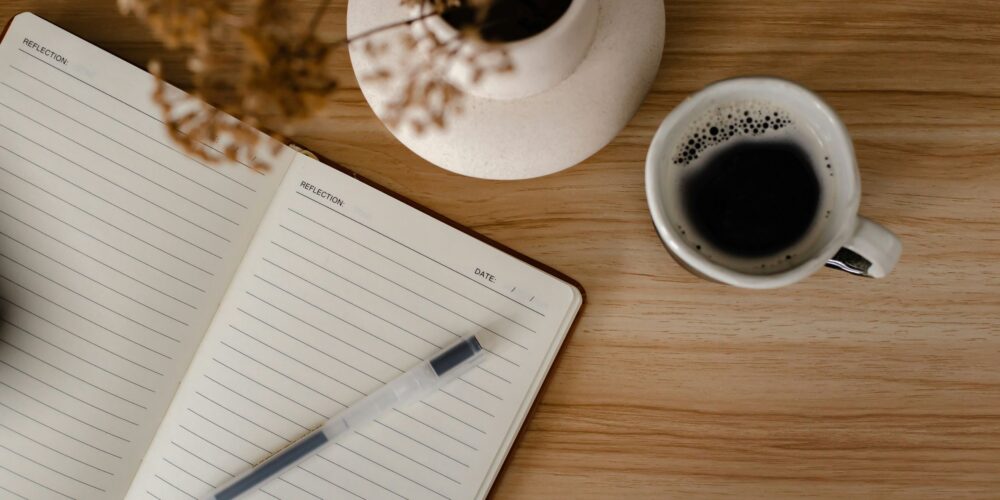




Leave a Reply